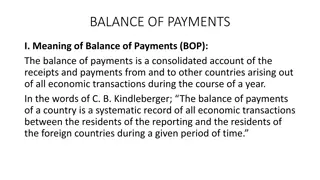
Analysis and Interpretations of Financial Statements for Decision Making
Explore the world of financial statements presented by Dr. S. D. Ratnaparkhe. Learn about the objectives, nature, types, and importance of financial analysis. Discover how to interpret financial data to make informed decisions. Dive into balance sheets, income statements, cash flow statements, and more to enhance your financial statement analysis skills.
Download Presentation

Please find below an Image/Link to download the presentation.
The content on the website is provided AS IS for your information and personal use only. It may not be sold, licensed, or shared on other websites without obtaining consent from the author. If you encounter any issues during the download, it is possible that the publisher has removed the file from their server.
You are allowed to download the files provided on this website for personal or commercial use, subject to the condition that they are used lawfully. All files are the property of their respective owners.
The content on the website is provided AS IS for your information and personal use only. It may not be sold, licensed, or shared on other websites without obtaining consent from the author.
E N D
Presentation Transcript
MANAGEMENT ACCOUNT Presented by Dr. S. D. Ratnaparkhe Assistant Professor Department of Commerce Deogiri College, Aurangabad
ANALYASIS AND INTERPRETATION OF FINANIAL STATEMENTS Financial Statement 1.Balance Sheet ,Schedules of B/S 2.Income Statements,(Trading A/C P & L A/C) 3. Cash flow Statements
Objectives of Financial Statement 1.To Assist in investment decision making 2.Economic Resources and obligation 3.Changes in net resources 4.To assist estimating the earnings& obligation 5.To disclose other infoamtion
Nature of Financial Statement 1.True and fair of Financial Statement 2.Summarised Report 3.Financial Statement prepared at the end 4.Financial Statement based on facts and records 5.Financial Statement prepared as per Generally accepted accounting principles 6Financail Statement influence on judgement
Analysis and Interpretations of Financial Statement Definitions Financial Statement analysis is largely a study of relationships among the various financial factors in a business, as disclosed by single set of statements and study of these factors as shown in a series of statements , - John N. Myer. The analysis and interpretation of financial statement are an attempt of determine the significance and meaning of the financial statements data so that the forecast may be made of the prospects for future earnings, ability to pay interest and debt maturates and profitability of a sound dividend policy by R.D.Kennedy and S.Y.Muller.
Types of Financial Analysis 1 Material used and 2.The modus operandi of analysis On the basis of material used. 1. External Analysis 2.Internal Analysis
On the basis of modus operandi of analysis 1. Horizontal Analysis 2.Vertical Analysis
Advantages or Importance of Financial Analysis 1. Importance for Management 2.Importance for the Bankers or Financial Institutions. 3.Importance for Trade Suppliers (Creditors) 4.Importance for Investors. 5.Importance to Managers 6.Importance to Employee 7.Importance to Government 8.Importance to Customer
Limitations of Financial Analysis 1.Accounting Concepts and Conventions 2.Financial Statements are interim report 3.Financial Statements disclose only monetary facts 4.It influence of personal views and judgment 5.Ignores Accounting for price level Changes
Tools or Techniques of Financial Analysis 1. Comparative Statements 2. Trend Analysis. 3.Common Size Statements 4.Funds Analysis 5.Ration Analysis






















